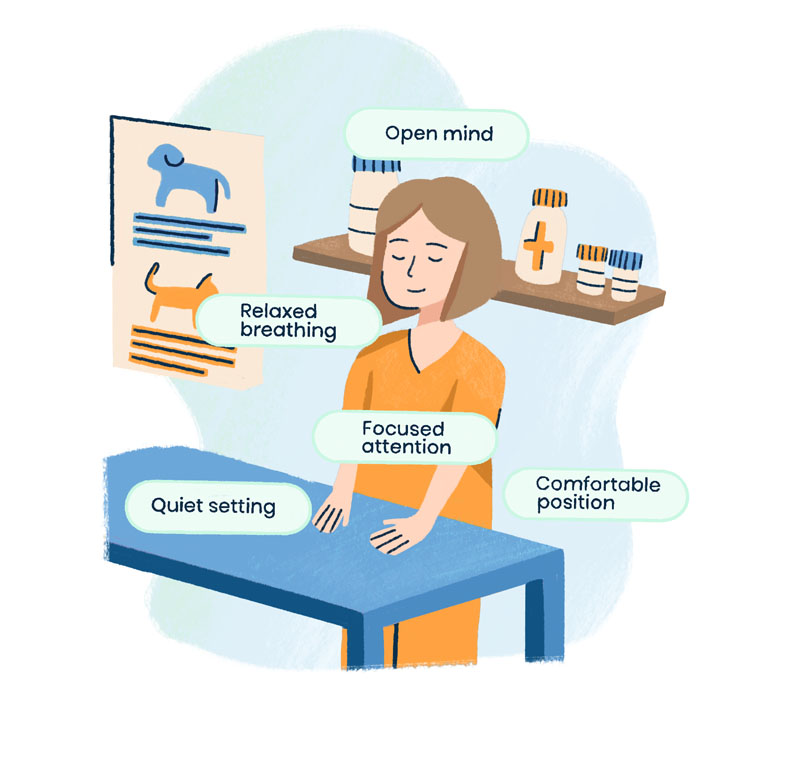Strategies to Improve Your Wellness
I Matter
Your mental health and well-being is within your control. This page offers a variety of strategies to help manage and improve your wellness.
Check In: How Am I Doing?
Being aware of your own mental wellness is the first step towards wellness. This is a method of self reflection that can help you understand who you are, and why you think and act the way you do.
There are many short tools out there to provide a self-assessment:
- This tool, from the Canadian Mental Health Association, offers a general check-in of how you’re doing.
Professional Quality of Life Assessment
- The American Veterinary Medical Association created this tool for assessing yourself for burnout and compassion fatigue.
- The Mood Disorder Association of Ontario offers this simple tool to self-screen for anxiety, depression, or other mood disorders.
You can also use a tracking program or diary to monitor and understand your own mental health. Here are a few great tools to get you started:

Interested in an Ontario veterinarian’s perspective on this topic?
Check out this podcast featuring Dr. Aron Bahn – The Importance of Prioritizing Yourself and Being Accountable For Your Own Happiness.
In the Moment: Short-Term Wellness Strategies
We all face times when we feel stressed, anxious, or uneasy. Try some of these strategies to help anchor yourself in the present. Take yourself from “mind full” to “mindful” by finding a strategy that helps remove distractions and emotions.

Here are a few examples we like:
Grounding
Grounding techniques help bring yourself back to the present by focusing on the senses (sight, hearing, smell, taste, touch). Here are a few examples:
- Breathing exercises to increase your vagal tone
- 4-7-8 technique: breath in for 4 seconds, hold for 7, out for 8 seconds.
- Belly breathing: place your hand on your belly just below your ribs, and push it out as you inhale deeply through your nose. Breathe out again through pursed lips, as if you were whistling.
- Need an audio guide for calm breathing?
- Need a visual guide for calm breathing?
- Try the 5, 4, 3, 2, 1 method to reduce anxiety
- Name 5 things you can see around you.
- Name 4 physical items you can feel at this moment (for example, the chair you are sitting on, the floor under your feet).
- Name 3 sounds you can hear right now.
- Name 2 things you can smell in the air right now (not difficult in a vet clinic!).
- Name 1 good thing about yourself.
- Trace the outline of an object with your eye
- Notice every detail, on every surface you can access.
- Describe the object as you would to someone who is trying to reproduce the object, and has never seen or heard of it.
- Consider colours, shapes, textures, size.

Exercise mindfulness
Similar to some of the grounding techniques, mindfulness is a practice that can help with short and long-term stress reduction, and improve your mental health2,3,4.
Mindfulness-based cognitive therapy, which is meditation-based, has been shown to help reduce symptoms of both anxiety and depression5. Mindfulness meditation practices can improve attention, memory capacity, and executive function6. It’s all about having an increased awareness and acceptance of living in the present moment.
Start simple:
Meditation doesn’t have to be formal or overly complicated. In fact, some of the grounding exercises above are simple forms of meditation! Mindfulness meditation is focused on what you experience during meditation, such as your heart beat, or breathing. Some of the keys include:
Quiet setting
Comfortable position
Focused attention
Relaxed breathing
Open mind
Try a body scan: become mindful of your physical state
Try sound meditation: stop and listen to the sounds around you
There’s an app for that:
There are many mobile apps out there that can walk you through short and simple exercises to improve wellness. A few of the most popular apps we like are:

Short physical activity
If you prefer a more concrete approach, physical activity can act not only as a distraction, but also halt some of the hormonal pathways that are activated with stress8. Stretching or yoga can be very relaxing, and improve your range of motion! Even a 10-minute walk during a break can help. Keep it simple and do what works for you!
Asking for (and accepting) help
Speak with a coworker you trust or phone a colleague when you need advice. If they cannot help you directly, they may be able to help you brainstorm solutions.
Acknowledge grief:
- Recognize that expressing emotions is not unprofessional.
- Recognizing and acknowledging that your work affects you will help you move forward.
Build Resilience: Buffer Yourself Against Bad Days
As much as we would like to keep home and work life separate, your brain doesn’t necessarily see it that way10. This is why it’s important to find strategies that work for you! Here are a number of evidence-based strategies to help build resilience4:
Build a strong social support network
This can mean work friends, non-work friends, family, or online support groups. Find those people who can support you through the tough times, so it’s easier to rebound.
Have a “Plan B”
This does not necessarily mean always planning ahead. It means being flexible and finding new and creative solutions when “Plan A” doesn’t go as expected. Remember this quote from Sheryl Sandberg,
“When one door of happiness closes, another opens; but often we look so long at the closed door that we do not see the one which has been opened for us.”
Sheryl Sandberg, Option B: Facing Adversity, Building Resilience, and Finding Joy
Practice self-compassion
We are often far less forgiving of ourselves than we are of others. Treat yourself with as much kindness as you would treat a patient, friend, or colleague.
Ask yourself:
- What would I say to a friend who’s just had the day I had?
- What would I say to another veterinarian who made this mistake?
Be mindful of your own thoughts and emotions
This means having awareness of your own physical and emotional state and how it affects your thoughts and behaviour. Instead of ruminating, find the silver linings. This can be done by putting your thoughts on paper. Expressive writing about an experience can help to explore thoughts and feelings.
Ask yourself:
- Do I need to step back from this situation, or call for support?
- Will this mix-up seem important next week?
- How is my body feeling? Hungry? Tired? Tense?
Protect yourself from unnecessary stress
Forgive yourself for being human and accept that you have limits, and that everyone’s limits are different. It may also help to identify stressors in your life that you can change and take steps to reduce or avoid them.
Embrace a “Growth Mindset”
This means understanding that we cannot be perfect, but we can learn, and get better.
Ask yourself:
- What did I learn? What can I take away from that situation?
- How can I handle that client differently next time?
- Was that comment a criticism, or feedback I can use?
Find workplace supports
Seek help when you need it and accept help when it is offered. Advocate for your own needs. Seek constructive feedback and promote a positive workplace culture.
Face your fears
While never easy, slowly and repeatedly exposing yourself to your fears causes you to tackle your emotions directly. It takes time, and support, but your fear will gradually lessen as you are exposed to the situation more (great for dealing with imposter syndrome!).

Resilience training – try this free, online
Mindfulness-Based Cognitive Therapy/Stress Reduction course
for a more structured approach to resilience-building
Download an infosheet on building resilience
Set Boundaries
We’ve all been there. The client with a sick pet that can’t afford the treatment, the coworker that needs you to cover a shift, the boss that can’t afford for you to take that day off, the client that texts at night. Whether it’s family, a friend, a coworker, or a client — It’s hard to say no.

This is especially true for those who work in a caring profession. But never saying no has its consequences, it stretches you thin. Something will eventually give, and we don’t want that to be you!
Strong personal and professional boundaries are key to your mental wellness and to your ability to be the best version of yourself. Your time and energy are limited resources, you need to use them wisely.
There is a tradeoff with every “no” you give. It’s easy to focus on the negative aspects of saying no — the patient won’t receive the care it needs, my boss will be mad, my client will need to wait. But, there are positives to boundaries; they:
- Define the parameters that allow you to be effective and efficient.
- Reflect your priorities.
- Enable you to offer the best service possible.
Boundaries aren’t about finding ways to keep people out, it’s about focusing on what’s important and setting reasonable limits on what you can take on. Take a moment to think about what’s important, what you need to be the best version of yourself (as an individual and a professional). Write them down, put them somewhere visible to remind yourself of what you value, and prioritize them!
Download an infosheet on setting boundaries

Download an infosheet on seeking feedback
Seek Feedback
Your current abilities can be improved through effort and feedback. Challenges, failures, and feedback can help you improve IF you embrace them as opportunities to do so. We call this a “growth mindset”. There is some good neuroscience to back this up too!
For more information:
Consider the Following
Ask your supervisor for feedback, or even a performance review. Receiving feedback (positive and negative) is consistently associated with work engagement and personal growth10.
Learn how to deal with negative feedback. Start by taking a deep breath and remaining calm. We are often defensive too soon, and are too quick to react. Acknowledge the feedback, recognize the issue, and take ownership over the feedback. Be respectful and assertive and ask for more information. Take some time to reflect on the issue in question and consider what changes might need to be made (by your and/or other parties involved) to prevent the situation in the future.
For more information:
The Right Way to Respond to Negative Feedback
Dealing with Negative Online Reviews
If you are a sole practitioner. Consider forming a practice group with other local (or online) practitioners to meet regularly, discuss cases, discuss veterinary-specific challenges, and solutions. Peer groups provide both social and professional support, and have been shown to reduce burnout and promote well-being in physicians17. Not One More Vet is a good place to discuss mental health challenges.
Interested in an Ontario veterinarian’s perspective on this topic?
Check out this podcast featuring Dr. Colleen Best – Using Self Reflection To Manage Personal and Professional Challenges.
Shake Self-Doubt: Imposter Syndrome
Know that you are not alone. The experience of imposter syndrome is well-described in veterinarians. It is important to admit failures and recognize them as teachable moments and learning experiences. But, it is also important to celebrate successes! Here are a few tips to dealing with feeling like an imposter:
Seek a mentor
Engage with experienced veterinarians who can help support you while you build confidence. Bounce ideas off them, and ask for their advice. Remember, we are all “practicing” medicine, some just have a lot more experience (successes and failures), which you can learn from!
Acknowledge what you know
Try being a mentor yourself to a new graduate or student veterinarian. This will build confidence and reassure you that you are indeed skilled and knowledgeable. Sometimes all you need is time to get more comfortable in your own skin as a veterinarian. Give yourself credit for what has worked well, even if they are small wins.
Talk about it
Discuss cases with colleagues! Talking about appointments, surgeries, or farm calls that went well or didn’t go well openly can open up dialogue about teachable moments, knowledge or experience gaps, and potentially even clinic protocols or training that needs improvement. It can be important to form a practice group. There are also online communities and medical resources for difficult cases, such as the Veterinary Information Network. Anonymous postings (Not One More Vet) can also provide feedback without fear of reprisal.
For more information:
- Who Am I Fooling? Imposter Syndrome in Veterinary Medicine
- Feeling Like a Fraud? You’re Not Alone
- Veterinary Practice: Imposter Syndrome
Interested in an Ontario veterinarian’s perspective on this topic?
Check out this podcast featuring Dr. Shannon Finn – Navigating Life as a New Graduate in Food Animal Medicine.

Check out this excellent Ted talk:
What is imposter syndrome and how can you combat it?
References
- Jerath, R., Crawford, M.W., Barnes, V.A. et al. Appl Psychophysiol Biofeedback (2015) 40: 107. https://doi.org/10.1007/s10484-015-9279-8
- Gu J, Strauss C, Bond R, Cavanagh K.How do mindfulness-based cognitive therapy and mindfulness-based stress reduction improve mental health and well-being? A systematic review and meta-analysis of mediation studies. Clin Psychol Rev. 2015 Apr;37:1-12. https://doi.org/10.1016/j.cpr.2015.01.006
- Solhaug, I., de Vibe, M., Friborg, O. et al. Long-term Mental Health Effects of Mindfulness Training: a 4-Year Follow-up Study. Mindfulness (2019) 10: 1661. https://doi.org/10.1007/s12671-019-01100-2
- Fjorback, L. O., Arendt, M. , Ørnbøl, E. , Fink, P. and Walach, H. (2011), Mindfulness‐Based Stress Reduction and Mindfulness‐Based Cognitive Therapy – a systematic review of randomized controlled trials. Acta Psychiatrica Scandinavica, 124: 102-119. https://doi.org/10.1111/j.1600-0447.2011.01704.x
- Chiesa A, Serretti A. Mindfulness based cognitive therapy for psychiatric disorders: A systematic review and meta-analysis. Psychiatry Res. 2011 May 30;187(3):441-53. https://doi.org/10.1016/j.psychres.2010.08.011
- Chiesa A, Calati R, Serretti A. Does mindfulness training improve cognitive abilities? A systematic review of neuropsychological findings. Clin Psychol Rev. 2011 Apr;31(3):449-64. https://doi.org/10.1016/j.cpr.2010.11.003
- Blaine Ditto, Marie Eclache, Natalie Goldman, Short-term autonomic and cardiovascular effects of mindfulness body scan meditation, Annals of Behavioral Medicine, Volume 32, Issue 3, December 2006, Pages 227–234. https://doi.org/10.1207/s15324796abm3203_9
- Anderson, E and Shivakumar, G. Effects of Exercise and Physical Activity on Anxiety. Front Psychiatry. 2013; 4: 27. Published online 2013 Apr 23. doi: https://dx.doi.org/10.3389%2Ffpsyt.2013.00027
- Polachek, Alicia J., and Jean E. Wallace. 2018. “The Paradox of Compassionate Work: A Mixed-Methods Study of Satisfying and Fatiguing Experiences of Animal Health Care Providers.” Anxiety, Stress and Coping 31 (2): 228–43. https://doi.org/10.1080/10615806.2017.1392224
- Mastenbroek, Nicole J J M. 2017. “The Art of Staying Engaged: The Role of Personal Resources in the Mental Well- Being of Young Veterinary Professionals.” Journal of Veterinary Medical Education 44 (1): 84–94. https://doi.org/10.3138/jvme.0216-041R1
- American Psychological Association. The Road to Resilience. https://www.apa.org/helpcenter/road-resilience
- Cake, Martin A., Michelle M. McArthur, Susan M. Matthew, and Caroline F. Mansfield. 2017. “Finding the Balance: Uncovering Resilience in the Veterinary Literature.” Journal of Veterinary Medical Education 44 (1): 95–105. https://doi.org/10.3138/jvme.0116-025R
- Gerber, Markus, Ingibjörg H. Jonsdottir, Magnus Lindwall, and Gunnar Ahlborg. 2014. “Physical Activity in Employees with Differing Occupational Stress and Mental Health Profiles: A Latent Profile Analysis.” Psychology of Sport and Exercise 15 (6): 649–58. https://doi.org/10.1016/j.psychsport.2014.07.012
- Walsh, Roger. 2011. “Lifestyle and Mental Health.” American Psychologist 66 (7): 579–92. https://doi.org/10.1037/a0021769
- Wolf, Megan R., and Jason B. Rosenstock. 2017. “Inadequate Sleep and Exercise Associated with Burnout and Depression among Medical Students.” Academic Psychiatry 41 (2): 174–79. https://doi.org/10.1007/s40596-016-0526-y
- Alvaro, Pasquale K., Rachel M. Roberts, and Jodie K. Harris. 2013. “A Systematic Review Assessing Bidirectionality between Sleep Disturbances, Anxiety, and Depression.” Sleep 36 (7): 1059–68. https://doi.org/10.5665/sleep.2810
- Swensen S, Kabcenell A, Shanafelt T. Physician-Organization Collaboration Reduces Physician Burnout and Promotes Engagement: The Mayo Clinic Experience. J Healthc Manag. 2016 Mar-Apr;61(2):105-27.
- Optimal Living Dynamics. 2019. How to stimulate your vagus nerve for better mental health. Available at: https://www.optimallivingdynamics.com/blog/how-to-stimulate-your-vagus-ner”
ve-for-better-mental-health-brain-vns-ways-treatment-activate-natural-foods-depression-anxiety-stress-heart-rate-variability-yoga-massage-vagal-tone-dysfunction